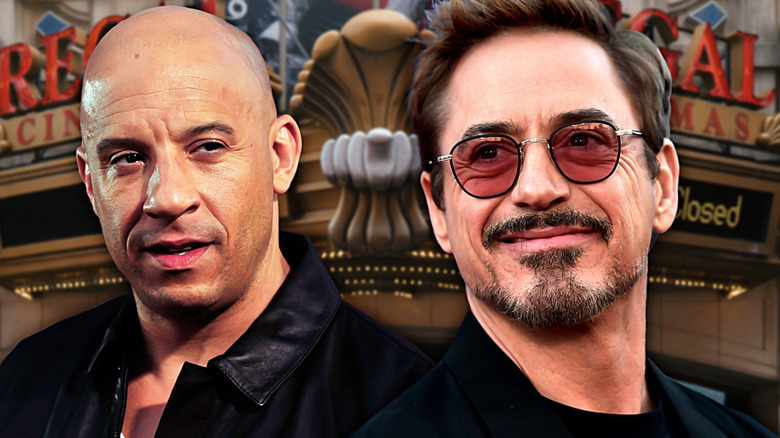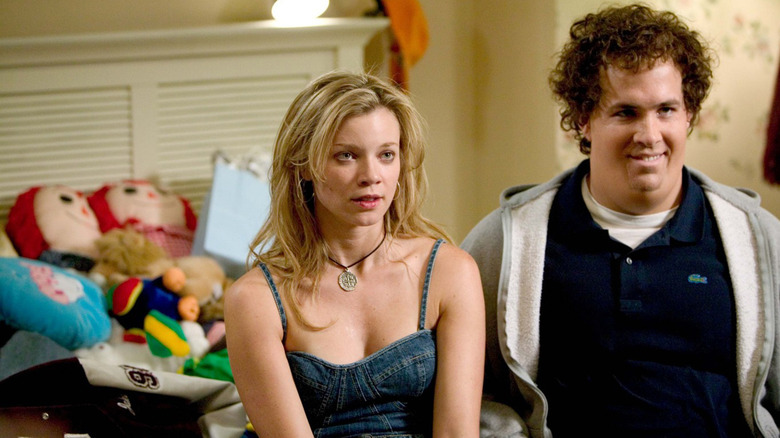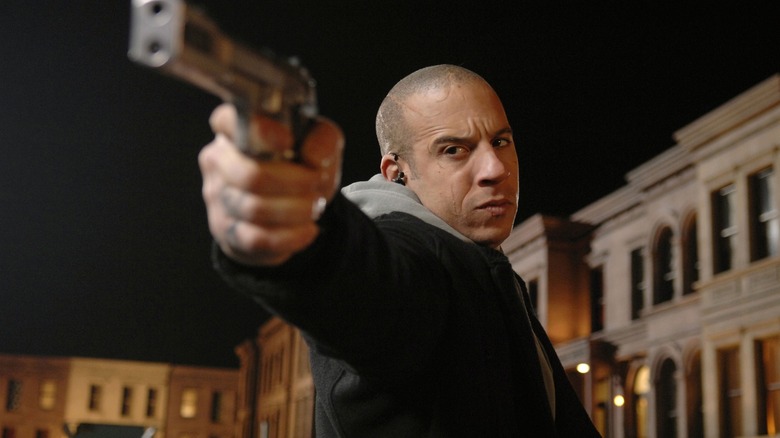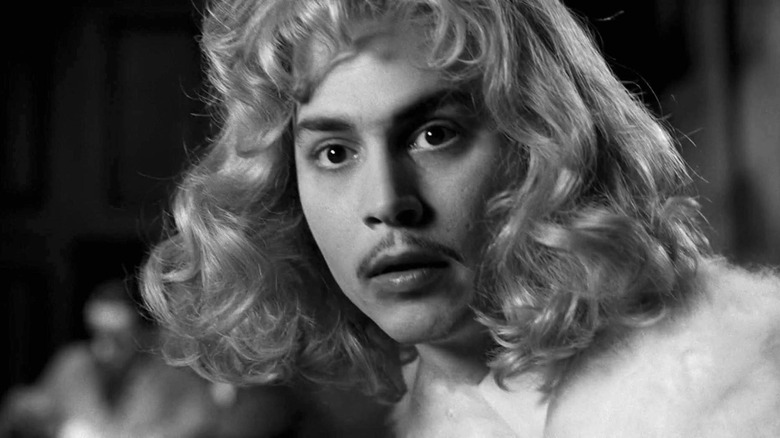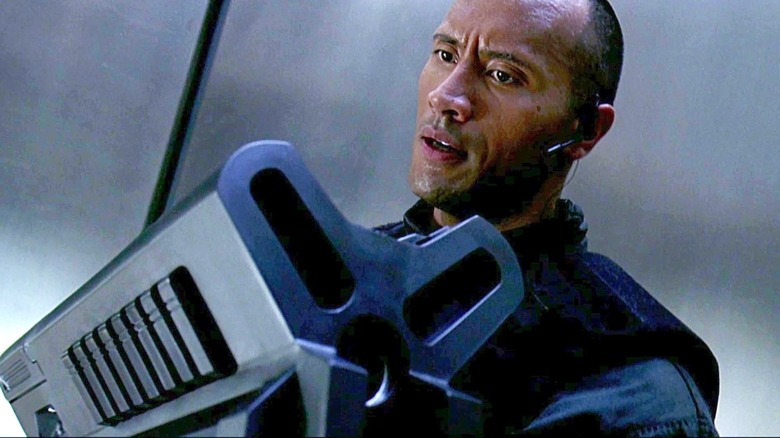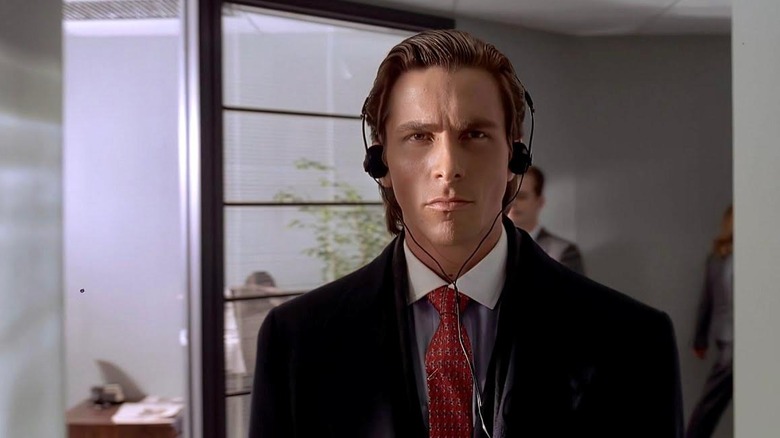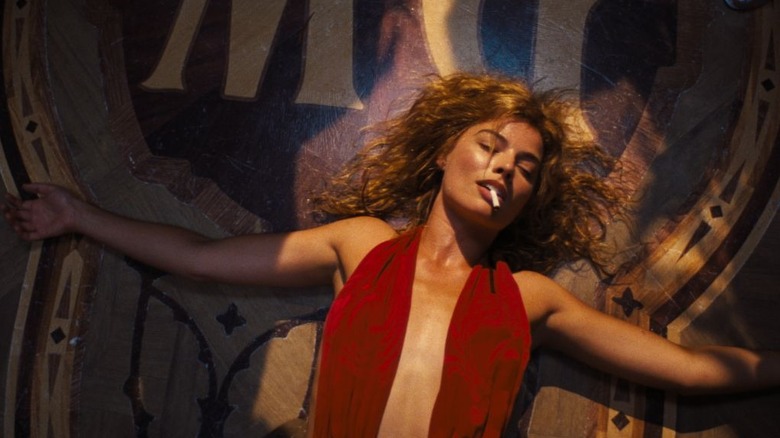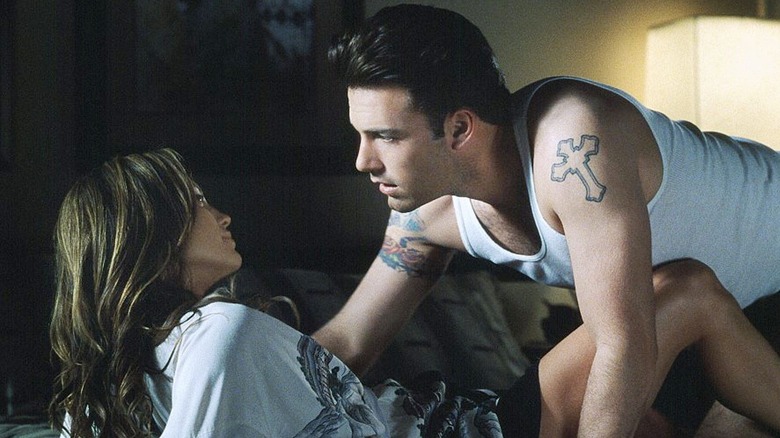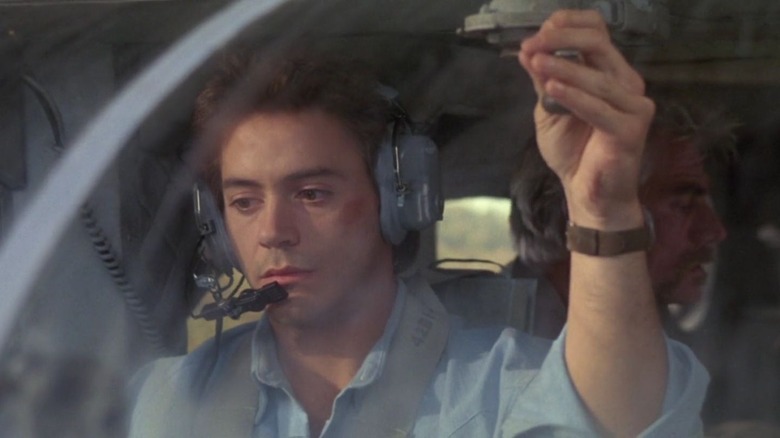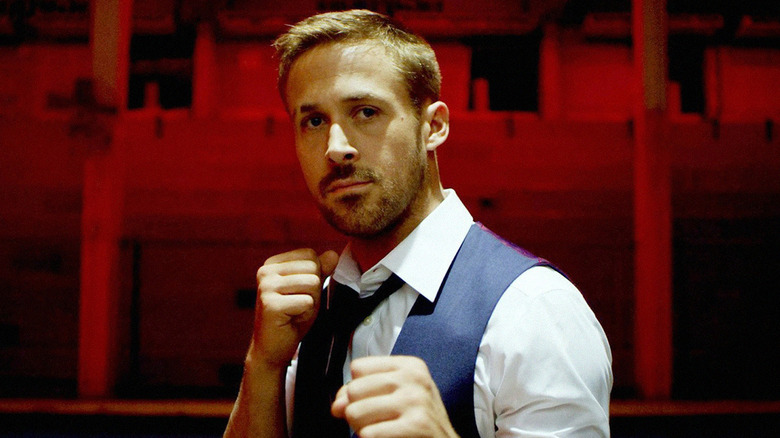Blockbuster Movie Stars Who Used To Be Box Office Poison
"Box office poison" entered the cinematic lexicon on May 4, 1938 when Manhattan's Independent Theatre Owners Association, Inc. penned an advertisement in "The Hollywood Reporter" begging producers to quit casting actors they claimed were "poison at the box office." Emblazoned across the ad was the headline "WAKE UP," followed by a jeremiad against A-listers such as Mae West, Joan Crawford, Fred Astaire, and Katherine Hepburn.
Yes, these stars are considered Hollywood icons now, but at the time they were either at the end of their runs (West) or on a box office dry spell (Hepburn). The ad wasn't meant to be mean-spirited, as the theater owners truly felt their businesses were suffering and wanted to revive the film industry. (Some things never change.)
There's a lot of nuance when it comes to what makes someone "box office poison." For some actors, it's a permanent state – their movies never make money. For others, it's a temporary condition. Thanks to a string of hits or a career-defining part (or both), they go from unbankable bust to blockbuster star — and sometimes back again. Fame is fleeting and fans are fickle, but there's no denying that for a time these movie stars were persona non grata before becoming guaranteed butts-in-seats box office draws. Maybe one day they'll even become Hollywood legends like Crawford and Hepburn, but whatever their fate, they defied the naysayers and escaped the "box office poison" label to become bona fide stars again.
Ryan Reynolds
Ryan Reynolds' run as Deadpool has earned that franchise more than $1.5 billion and counting worldwide. This makes the "Deadpool" movies not only the most successful in the "X-Men" franchise, but more impressively, one of the most successful R-rated series, period. It wouldn't be possible without Reynolds' signature smart-aleck charm, which at this point makes him almost indistinguishable from Deadpool, aka Wade Wilson, himself. It truly is hard to determine where the actor ends and the character begins, though we suspect Reynolds isn't a Special Forces-trained mercenary with mutant healing abilities.
Yet it was Reynolds' same smug smart-assery that arguably kept him from superstardom for the first 18 years of his career. Before "Deadpool," Reynolds' biggest hits were as a supporting actor to bona fide bankable stars Sandra Bullock in "The Proposal" and Denzel Washington in "Safe House." Whenever he went to bat by himself, he failed spectacularly, leaving a string of bombs in his wake — including the massive, career-killing, back-to-back comic book movie flops "Green Lantern" and "R.I.P.D." Reynolds was well on his way to being a case of "what could have been" until "Deadpool" shocked Hollywood with its $781 million global haul. Yet it's not just "Deadpool," as Reynolds has parlayed that success to become a bankable draw on his own, as proven by hits like "The Hitman's Bodyguard," "Pokemon: Detective Pikachu," and "Free Guy."
Vin Diesel
You can go back and forth between "box office poison" to "bankable movie star" throughout a career. Take Vin Diesel for example. His first major role was a supporting part in Steven Spielberg's super-successful "Saving Private Ryan" in 1998, but he followed that up with three underperformers in a row. Diesel's career seemed to get into high gear with the one-two punch of 2001's "The Fast and The Furious" and 2002's "xXx," establishing himself as a major action movie star ... but apparently, he didn't really want to do action movies, as he turned down sure-thing sequels to "The Fast and The Furious" and "xXx" for other roles. We won't fault a guy for pursuing passion projects, but "The Chronicles of Riddick?" "Babylon A.D.?" C'mon, man.
Diesel did have one hit with the 2005 family flick "The Pacifier," but otherwise starred in a string of duds until he returned to the driver's seat (and the producer's chair) of the "Fast" franchise with 2009's "Fast and Furious." Diesel has wisely stayed in the family as patriarch Dominic Toretto ever since, helping that series speed away with billions. He even returned to the "xXx" franchise as Xander Cage in, well, "xXx: Return of Xander Cage" in 2017. Throw in his voice performance as Groot in the Marvel Cinematic Universe, where he makes millions literally just saying "I am Groot," and Diesel is back to being bankable by staying in his lane as an action movie star.
Johnny Depp
Johnny Depp's career has ridden more stormy seas than the Black Pearl. He was on a downward slope after 2012's "The Lone Ranger" became one of Disney's biggest live-action failures, shooting blanks at the box office with $260 million worldwide. Yet as "Pirates of the Caribbean: Dead Men Tell No Tales" proved with its $794 million worldwide take in 2017, Depp's still worth a pirate's treasure chest as Captain Jack Sparrow. But it wasn't always so.
To his credit, Depp has gone down his own path for most of his career, resulting in iconic parts in "Edward Scissorhands," "Ed Wood," "Fear and Loathing in Las Vegas," and "What's Eating Gilbert Grape?" Yet his pre-"Pirates" career didn't make much money, as his only $100+ million worldwide grosser with him as the top-billed star was Tim Burton's "Sleepy Hollow," which scared up $207 million in 1999.
Given his less-than-remarkable run, casting Depp in a big-budget, would-be blockbuster (about pirates no less, a notoriously iffy genre) seemed like a risk. Turns out, Depp was a discount. "Pirates of the Caribbean: The Curse of the Black Pearl" yo-ho-ho'd its way to $654 million worldwide in 2003, a massive sum that was dwarfed by the sequel, 2006's "Pirates of the Caribbean: Dead Man's Chest." Captain Jack steered Depp seven seas away from his days as "box office poison" — with the help of 2010's billion-dollar-plus grossing "Alice in Wonderland" — although his future with the "Pirates" franchise looks dead in the water after his recent personal scandals.
Dwayne Johnson
Dwayne Johnson earned a reputation as "franchise Viagra" after invigorating stalled or dormant series like "The Fast and The Furious," "Jumanji," "G.I. Joe," and "Journey To The Center of the Earth." Yet before Johnson was a cinematic performance enhancer, he was rather limp at the box office.
Johnson's big screen career kicked off strong with a key supporting role in 2001's "The Mummy Returns," which earned $435 million worldwide. That was followed by a starring role in only his second film, the spinoff "The Scorpion King." While that film trailed its predecessor, its $165 million worldwide haul is still a pretty solid sophomore outing, especially considering it made Johnson the highest paid first-time leading man ever.
What goes up, must come down, especially if it's a Rock (sorry, not sorry). Johnson's old-school action star act wasn't connecting with an audience that preferred moody men in tights, so he floundered in borderline B-list shoot 'em ups ("Walking Tall," "Faster"), as well as semi-successful, but poorly-executed family flicks like "The Tooth Fairy" and "Race To Witch Mountain." Clearly a change was in order. Johnson got new management and returned to the gym, reasserting himself as an A-list action star, first with a major supporting role as Hobbs in the "Fast and Furious" franchise, then on his own in "San Andreas," "Rampage," and "Skyscraper." While 2022's under-performing "Black Adam" humbled him, as a movie star Johnson has proven himself solid as a Rock (again, not sorry) when it comes to his biggest blockbusters and bombs.
Christian Bale
Christian Bale was about as far from being a movie star as one could get before Christopher Nolan cast him as the title character in 2005's "Batman Begins." Even though he convincingly played a billionaire in that effort, Bale's pre-Bruce Wayne filmography is a collection of underperformers and flat-out flops.
His only hits were voicing Thomas in 1995's "Pocahontas," and playing the snide supporting villain in 2000's "Shaft." Even his "career-making" role in "American Psycho" was a flop in theaters, as the film's cult status overshadows the fact that its $34 million worldwide is less than Patrick Bateman carried in his wallet. Bale was so unbankable that he was the only child "star" to bomb in a Steven Spielberg movie, 1987's "Empire of the Sun," while 1992's "Newsies" was a rare musical misfire during Disney's renaissance. It was bad.
Heck, even "Batman Begins" only opened to $48 million, a bland start for a would-be blockbuster franchise. Quality won out, as "Batman Begins" legged it out to $356 million worldwide, building a bigger audience for its billion-dollar sequels, "The Dark Knight" and "The Dark Knight Rises." Batman made Bale a bankable A-lister whose name could get a movie bankrolled, though his preference for acting in less-mainstream movies will probably keep him from reaching the ranks of Tom Cruise or Sandra Bullock. Still, he remains a proven draw in the right role, starring in high-grossing grown-up movies like "The Big Short," "American Hustle," and "Ford v Ferrari."
Margot Robbie
In Hollywood, perception is everything. If you have earned a reputation as "box office poison" within the critical community (or worse, among the film industry), it can stick with you — whether it's fair or not. That is exactly what happened to Margot Robbie, with The New York Post saying she was "a phenomenal actress without a doubt, but she's drawn to box office bombs like flies to rotting meat."
What's the truth? As with many things, it's nuanced. There's no denying that Robbie's performance as Harley Quinn (in the character's big-screen debut) was a massive reason for that 2016 film's $745 million haul. However, the appeal was short-lived, as her next two turns at bat as Harley didn't earn half that. Robbie's other big hits were mostly as a "value-add" in movies starring established draws like Leonardo DiCaprio and Will Smith, while her solo starring roles underwhelmed. Meanwhile, she took the brunt of the blame for "Babylon" and "Amsterdam" totally tanking in 2022, despite being part of an ensemble. She might not have been "box office poison," but maybe Poison Lite?
Still, all of that went out the window with 2023's "Barbie," which opened to a massive $151 million, while topping the year with $636 million domestically and $1.4 billion worldwide. Whatever her pre-"Barbie" results, there's no denying she's now as solid gold as that plastic doll.
Ben Affleck
Can you be a bankable movie star and "box office poison" at the same time? You can if you're Ben Affleck. His $6.3 billion worldwide earnings are impressive by any measure, but we can't forget there are a ton of turkeys in his oeuvre. Following the $225 million that "Good Will Hunting" made in theaters, and the Oscar gold its screenplay earned Affleck and Matt Damon, Hollywood tried to make Affleck a movie star. Results were mixed, with Michael Bay movies "Armageddon" and "Pearl Harbor" making bank, while head-scratchers like "Reindeer Games" and "Changing Lanes" left us to question Affleck's taste.
The wheels finally came off while he was on the Bennifer Bus (part 1) with the debacle "Gigli," which made just $7 million worldwide, Affleck found redemption in front of the camera by getting behind it, directing himself in some of his best movie roles to date. He directed his first big hit as a leading man in nearly a decade with 2010's "The Town," ($152 million worldwide), then did it again with 2012's "Argo" ($227 million worldwide), which also won Best Picture, completing one of the biggest comeback stories in Hollywood history.
So is Affleck back as a bankable movie star? Kinda. While his time in the cowl as Batman yielded mixed results, his only non-Batman hits have been 2014's "Gone Girl" ($367 million worldwide) and 2016's "The Accountant" ($152 million worldwide). Otherwise, Ben's had a bevy of busts. Still, he's a long way from the dark days of "Gigli," so there's that.
Greta Gerwig
Greta Gerwig made a name for herself as an indie darling actress, starring in such well-regarded but underseen films as "Greenberg," "Frances Ha," and "Mistress America." As an actress, Gerwig's films have earned $408 million worldwide. Not bad, except most of that comes from "best friend" parts in films like "No Strings Attached." As a leading lady she's a big hit with your indie film nerd friend, but not someone studios would consider bankable. That is, until she became a director.
Her directorial debut, "Lady Bird" in 2017, nabbed a mighty (for an indie flick) $80 million worldwide, and earned her Oscar noms for writing and directing. She more than doubled that film's global total with an adaptation of Louisa May Alcott's "Little Women" ($218 million worldwide) in 2018 and earned herself another Oscar nom. Then, she earned more than six times what "Little Women" made with 2023's billion-dollar blockbuster "Barbie," ($1.4 billion worldwide), and got herself another Oscar nom too.
Three films. Four Academy Award nominations. More than $1.7 billion in global box office. There's no doubt "cineastes" would love to see Gerwig back on the big screen at their local indie theater, but she's a blockbuster star as a director. Next up for Gerwig is a "Chronicles of Narnia" adaptation. Though she says she is "properly scared" of "The Chronicles of Narnia," we think she has nothing to worry about.
Robert Downey Jr.
Robert Downey Jr. has Oscar gold in his cabinet for 2023's "Oppenheimer," and even more plain old gold in his bank account for his run as Tony Stark. As hard as it is to believe now, Downey was once the textbook definition of "box office poison." While Downey shot to fame quickly in his career, albeit in some early roles he would like you to forget about, his celebrity status was more for his extracurricular activities than his considerable acting prowess. Sure, he was nominated for an Academy Award for the title role in 1992's "Chaplin," but he was more notorious for antics such as trespassing and passing out at his neighbor's house.
But hey, bad behavior is excused if you bring the bling. Alas, Downey didn't. For the first 25 years of his career, Downey didn't make one movie that grossed more than $100 million. It was so bad, he even brought big bankable stars down with him, as with 1990's "Air America," one of Mel Gibson's biggest bombs, and "Soapdish," a major dud on Sally Field's resume.
Downey's turnaround came slowly but surely in the new millennium, thanks to his buddy Gibson putting up the money to insure him for "The Singing Detective," and director Jon Favreau going to bat for him as Tony Stark. It worked pretty well: Downey's inaugural "Iron Man" film grossed $585 million worldwide, four times his previous biggest earner, "Gothika," and launched the most successful franchise ever.
Ryan Gosling
Actors' careers don't start off much stronger than Ryan Gosling's. Debuting in show business as a Mouseketeer on the newly revamped "Mickey Mouse Club," Gosling made his big-screen debut with a supporting role in 2000's "Remember The Titans," starring certified box office draw Denzel Washington. By 2004, Gosling got above-the-title billing in romantic drama "The Notebook," whose $115 million worldwide gross was hardly "Titanic," but enough to make Gosling a movie star ... or so Hollywood thought.
Despite a string of starring vehicles, Gosling didn't break $100 million worldwide for another seven years, with a supporting role behind Steve Carell in "Crazy, Stupid, Love." Despite acclaimed performances in films like "Drive" and "The Nice Guys," Gosling's box office performances over the next 10 years were pretty so-so. There was 2016's "La La Land," which earned $433 million (co-starring reliable draw Emma Stone); but there were also duds both big ("Blade Runner 2049") and small ("Only God Forgives"). Basically, Gosling wasn't a movie star, but he convincingly played one.
Gosling turned a corner with "Barbie" in 2023, which earned $1.4 billion worldwide in large part to his scene-stealing, Oscar-nominated performance as Ken. Maybe Gosling is a movie star? Well, he was back to his usual routine with 2023's "The Fall Guy," which opened to a meager $27 million, but has legged it out to more than $175 million. Like many modern movie stars, Gosling may not be the most bankable actor, but in the right role, he's more than Kenough.
